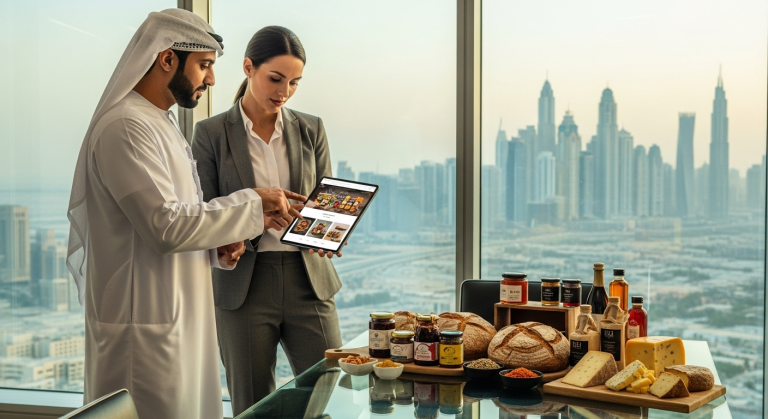Market Analysis and Opportunities
The United Arab Emirates, particularly Dubai, stands at the crossroads of global commerce and culinary innovation. As consumer demand for unique, high-quality food experiences surges, the launch of an online platform for artisanal food products represents a timely, lucrative business opportunity. Driven by the region’s growing population of discerning residents, both locals and expatriates, as well as thriving tourism, this sector is ripe for digital transformation. In this section, we analyze the market opportunities underpinning business in Dubai for artisanal food ecommerce—essential insight for entrepreneurs, investors, and business managers.
Target Market Analysis
- Dubai’s food and beverage (F&B) sector is one of the fastest-growing in the region; the UAE’s F&B market is forecasted to surpass AED 142 billion ($39 billion) by 2025 (source: Dubai Chamber).
- Within this, the demand for artisanal and specialty food products is escalating, reflecting global health, sustainability, and authenticity trends.
- Market research suggests that online grocery and specialty food shopping in Dubai has a projected CAGR of 17% between 2022 and 2027 (source: Statista).
- Consumers in Dubai are tech-savvy, quality-oriented, and increasingly seek gourmet groceries and bespoke experiences unavailable via mass-market supermarkets.
- The affluent population (with high per capita income) and the presence of approximately 200 nationalities make for a diverse and receptive audience for artisanal foods.
Industry Trends and Consumer Behavior
- Premiumization: Consumers are willing to spend more for high-quality, organic, locally sourced, and ethically produced products.
- Digital transformation: Online food retail channels are rapidly displacing traditional sales models, accelerated by the pandemic and permanent behavioral shifts.
- Sustainability: Products with eco-friendly packaging or sustainable sourcing, and platforms that highlight ethical supply chains, are in high demand.
- Experiential consumption: Curated food boxes, chef collaborations, and storytelling—about producers, ingredients, and origins—encourage consumer loyalty and recurring purchases.
Expansion Potential
- The UAE’s geographic position and business-friendly climate allow for rapid scaling to other Emirates and the GCC region, thanks to logistics infrastructure and regulatory initiatives like Dubai CommerCity.
- B2B expansion: Supplying boutique hotels, gourmet restaurants, and exclusive events presents high-margin contracts.
- Diversification: Including export opportunities to nearby Asian and European markets, leveraging Dubai’s logistics hubs like JAFZA and Dubai Airport Free Zone.
Marketing Needs and Recommendations
- Robust market research is essential to identify top-performing product categories (e.g., organic honey, craft cheeses, specialty spices).
- Digital-first marketing is crucial: prioritize SEO, content marketing, and targeted social media campaigns to engage Dubai’s cosmopolitan audience.
- Consider strategic use of influencer partnerships, pop-up events, and collaborations with Dubai’s culinary scene to boost brand visibility.
- Branding should emphasize authenticity, provenance, and sustainability to differentiate from mainstream online grocery platforms.
- To gain an edge, explore services for business setup in Dubai or contact firms specializing in digital market entry to fast-track online presence and customer acquisition.
Comprehensive Business Overview
The proposed online platform connects discerning consumers with premium, small-batch, and handcrafted food products sourced from both local and international artisans. This venture operates in Dubai’s dynamic digital commerce sector, focusing on curated F&B products often overlooked by large supermarket chains.
- Business Model: B2C ecommerce, possibly augmented with B2B channels for the hospitality sector. Revenue streams include sales commissions, subscription fees for curated boxes, and featured producer listings.
- Target Audience: Affluent local and expatriate residents, health-conscious and gourmet-oriented consumers, corporates seeking unique gifts, and F&B outlets.
- Operational Scope: Initially Dubai, with plans to expand to Abu Dhabi and the wider GCC via digital marketing and efficient logistics partnerships.
Mission: To empower local and international food artisans by providing a premium digital platform that connects them directly with Dubai’s diverse and quality-oriented consumers.
Vision: To become the UAE’s leading online marketplace for artisanal food, celebrated for authenticity, innovation, and sustainability.
Core Objectives:
- Build a curated portfolio of artisanal food products.
- Deliver a user-centric, seamless ecommerce experience.
- Establish exclusive partnerships with top producers.
- Set new standards in digital food retailing and sustainability.
Business Stage: Startup, ideally located in a Dubai Free Zone such as Dubai CommerCity or Dubai Multi Commodities Centre (DMCC) to leverage tax benefits and ecommerce infrastructure.
Competitive Advantage
Unique Value Proposition (UVP)
- Curated exclusivity: Access to hard-to-find, high-quality artisanal foods not stocked by major online groceries.
- Transparent sourcing: Products spotlighting origin stories and sustainability credentials.
- Superior digital experience: Intuitive platform with seamless logistics, reliable delivery, and personalized customer touchpoints.
For the Entrepreneur
- High scalability, leveraging Dubai’s digital ecosystem and logistics hubs.
- Low overheads and asset-light business model compared to physical retail.
- Income diversification through commissions, subscriptions, and institutional B2B sales.
For the Investor
- Strong market fundamentals in Dubai’s expanding ecommerce and F&B sector.
- Attractive ROI prospects, evidenced by increasing online food demand and premiumization trends.
- Ability to scale regionally, tapping into the $74 billion GCC F&B market.
For the Manager
- Operational efficiency using automation tools (e.g., order management systems, CRM).
- Potential for exclusive supplier agreements, boosting competitive edge.
- Strong brand-building opportunities linked to sustainability and authentic storytelling.
Financial and Investment Needs
Financial Requirements
Initial setup and operational costs in Dubai can be estimated as follows (values in AED):
- Company Registration and Licensing: 25,000 – 40,000
- Licensing (Free Zone or Mainland): 12,000 – 25,000 annually
- Website/App Development: 50,000 – 100,000+
- Staff Recruitment and Salaries (first year): 300,000
- Marketing and Branding: 150,000
- Logistics and Warehousing: 60,000 – 120,000
- Working Capital (inventory, contingencies): 100,000+
Total suggested capital for launch: 500,000 – 800,000 AED, depending on scale and initial market reach.
Investment Potential
- Excellent prospects for scalability across the UAE and wider GCC region.
- Strong demand for high-quality food platforms translates to rapid customer acquisition and above-average returns.
- Investment models: Equity (preferred for strategic partners and VCs), convertible notes, or revenue-based financing.
- Favorable startup ecosystem with government grants and incentives available for F&B innovation in Dubai Free Zones.
For stakeholders exploring investment consulting services, this sector offers compelling entry points with moderate capital expenditure and fast go-to-market timelines.
Financial Risks and Mitigation Strategies
- Cash Flow Management: Careful forecasting, leveraging pre-orders/subscriptions for upfront revenue.
- Regulatory changes and compliance costs: Ensure alignment with evolving food and ecommerce laws.
- Logistics costs inflation: Negotiate long-term contracts with third-party providers; diversify supplier base.
- Diversified revenue streams: Minimize dependency on a single market segment through B2B and export sales.
- Insurance: Secure business liability, inventory, and cyber risk coverage.
Human Resources and Recruitment
Workforce Needs
- Initial team: 8–12 (including operations manager, logistics coordinator, ecommerce manager, marketing lead, customer support, tech developer, and warehouse staff).
- Key expertise: Ecommerce platform management, digital marketing, F&B product curation, supply chain optimization.
- Specialized roles: SEO experts, social media managers, and data analysts to drive digital growth.
HR Challenges
- High competition for experienced tech and digital marketing talent in Dubai.
- Retention may be difficult due to the dynamic startup ecosystem.
- Training is vital for product knowledge, customer service, and compliance.
Strategies: Offer competitive compensation, career growth pathways, flexible work arrangements, and continuous upskilling.
Compliance with UAE Labor Laws
- All employees should be contracted in line with UAE Labor Law, with clear job descriptions, healthcare coverage, and end-of-service gratuity.
- Sponsorship/visa processes (via Free Zone authorities) must be transparent and prompt.
- Implement robust HR policies: onboarding, performance management, and safety compliance.
Infrastructure and Operations
Infrastructure Needs
- Hybrid setup: Virtual headquarters complemented by a small warehouse or fulfillment center in a cost-effective Free Zone (e.g., Dubai South, CommerCity).
- Tech stack: Cloud-based ERP, ecommerce CMS (e.g., Shopify Plus, Magento), CRM systems, secure payment gateways.
- Use of third-party logistics (3PL) providers to minimize fixed costs.
Operational Optimization
- Adopt lean inventory management to reduce waste and inventory costs.
- Automate order processing and customer notifications to ensure seamless CX.
- Integrate analytics for data-driven inventory, sales, and marketing decisions.
Legal Compliance
- Company registration via DED or preferred Free Zone for 100% foreign ownership and simplified regulation.
- Food safety compliance: Dubai Municipality permits for F&B operations.
- Corporate bank account setup with approved UAE banks.
Innovation and Technology
- Utilize AI-driven product recommendations and personalized offers.
- Leverage blockchain for supply chain transparency if feasible.
- Continue digitizing back-office processes and supplier onboarding.
Marketing and Branding Strategies
Brand Status
- Develop distinct visual identity and a compelling brand story emphasizing authenticity and artisanal values.
- Utilize testimonials, producer stories, and interactive content for digital trust-building.
Marketing Channels
- Prioritize Google SEO, Google Ads, and targeted Facebook/Instagram campaigns to reach food-forward audiences in the UAE.
- Content marketing: Regularly update a blog focused on artisan trends, producer features, and gourmet recipes, leveraging internal linking to industry blogs for best practices.
- Participate in food-themed expos, Dubai Food Festival, and niche F&B events.
360-Degree Campaigns
- Launch integrated campaigns combining digital ads, influencer partnerships, and email marketing.
- Offer online workshops, tasting sessions, and pop-up events to drive engagement and brand loyalty.
- Encourage user-generated content and referrals to boost organic reach.
Growth and Development Potential
Growth Strategies
- Expand portfolio to include exclusive chef lines, organic meal kits, or culinary experiences.
- Forge partnerships with hospitality groups, wellness brands, and corporate gifting channels.
- Develop a loyalty/rewards program for repeat customers.
Networking
- Connect with artisan producers, logistics partners, and fintech service providers.
- Engage with local chambers (e.g., Dubai Chamber of Commerce) and participate in Free Zone networking events.
- Leverage international networks for scale, such as those highlighted on Persian Horizon’s global platform.
International Potential
- Dubai’s status as a global trade and logistics hub streamlines cross-border ecommerce and regional expansion.
- Leverage Dubai’s proximity to Africa, South Asia, and Europe for export and procurement deals.
- Pursue halal certification and product adaptation for expansion into Gulf Cooperation Council (GCC) and broader MENA regions.
Sustainability and Innovation
- Prioritize eco-friendly materials, packaging, and carbon-neutral delivery options.
- Align innovation with Dubai’s Vision 2030 for digital transformation and green economy goals.
Alignment with Dubai’s Market
Cultural Alignment
- Feature halal-certified and culturally diverse offerings to appeal to Dubai’s multicultural residents.
- Multi-lingual platform content (English and Arabic at minimum) to accommodate different user groups.
- Promote inclusivity by onboarding minority and women-led producer brands.
Local Regulatory Compliance
- Ensure all commercial, tax, and labor laws are observed, including VAT registration, municipal F&B permits, and annual license renewal.
- Conduct regular compliance audits and stay alert to regulatory shifts.
Advantages of Dubai
- Tax-free environment and free repatriation of profits in Free Zones.
- World-class infrastructure in logistics, technology, and digital payment systems.
- Access to a global consumer base and investors thanks to Dubai’s connectivity and business-friendly policies.
Local Challenges and Solutions
- High competition: Differentiate via unique selection, customer storytelling, and value-added services.
- Operational costs: Utilize shared warehousing, cloud kitchens, and third-party logistics to contain expenses.
- Regulatory complexity: Engage local consultants or business services providers for setup, licensing, and compliance management.
Conclusion
The online platform for artisanal food products is strongly positioned to seize business opportunities in Dubai’s innovative, high-growth ecommerce sector. Robust consumer demand, digital maturity, and Dubai’s global reputation for culinary diversity underpin the case for investment in UAE and regional expansion. The venture’s success lies in its ability to curate quality, embrace tech-driven processes, build brand authenticity, and stay attuned to Dubai’s unique cultural and regulatory context.
Actionable Recommendations
- Prioritize Free Zone company setup for cost-effective operations and market flexibility.
- Launch with a core portfolio of high-demand, culturally relevant products and scale gradually based on data-driven insights.
- Use digital-first marketing and invest in robust supply chain and operations tech from the outset.
- Explore strategic guidance and business setup services for streamlined market entry and compliance.
- Foster innovation and sustainability as key brand pillars to align with Dubai’s Vision 2030.
For stakeholders seeking comprehensive support—from market research to licensing and scaling—consider consulting specialists like Persian Horizon for expert guidance in navigating Dubai’s dynamic business ecosystem. Explore their range of services to unlock the full growth potential of your artisanal food business in the UAE.







